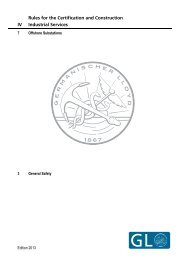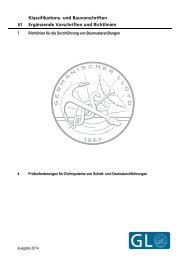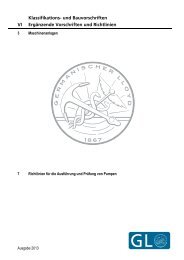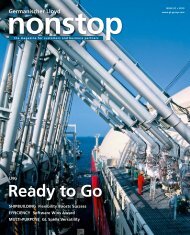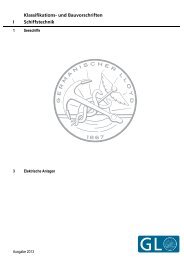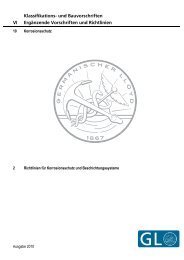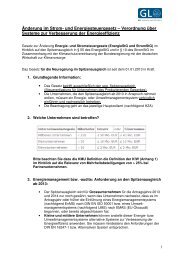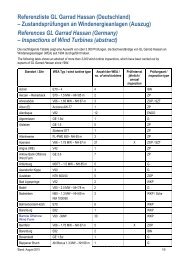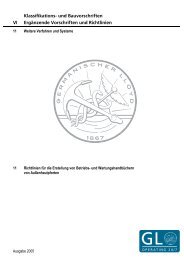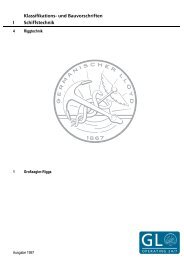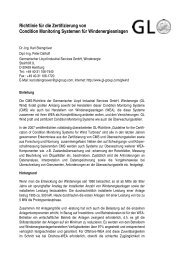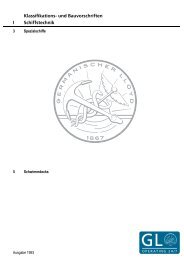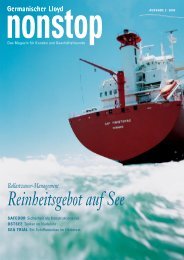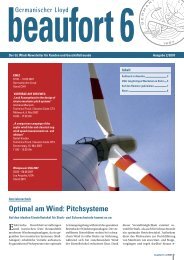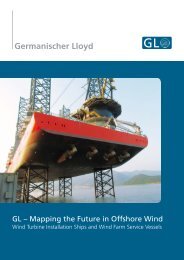Protection of Fuel Tanks Safety ahead! - GL Group
Protection of Fuel Tanks Safety ahead! - GL Group
Protection of Fuel Tanks Safety ahead! - GL Group
Create successful ePaper yourself
Turn your PDF publications into a flip-book with our unique Google optimized e-Paper software.
It gives technical advice for updating the legislation. In<br />
addition, it facilitates technical operation between member<br />
states and the Commission. Thirdly, after the sinking<br />
<strong>of</strong> the tanker Prestige, it was decided to give EMSA an operational<br />
task in the field <strong>of</strong> pollution response, which is<br />
complementary to the response mechanisms <strong>of</strong> the member<br />
states.<br />
nonstop: How does EMSA monitor the implementation <strong>of</strong><br />
EU maritime legislation and what are the priorities?<br />
de Ruiter: At present the Agency is involved in different<br />
types <strong>of</strong> assessments:<br />
Firstly, we assess maritime administrations regarding their<br />
obligations as flag states and as port states. One priority is<br />
Port State Control. Member states are required to inspect<br />
at least 25% <strong>of</strong> the ships which enter their ports. EMSA<br />
controllers ensure that Port State Control <strong>of</strong>ficers throughout<br />
the EU apply the same methods. EMSA also publishes<br />
the list <strong>of</strong> vessels that are banned from European ports because<br />
<strong>of</strong> grave deficiencies.<br />
Secondly, we assess classification societies.<br />
Thirdly, we assess educational systems in third countries,<br />
verifying compliance with the STCW convention rules for<br />
training <strong>of</strong> seafarers. Our motive: 75% <strong>of</strong> seafarers on EU<br />
registered ships originate from non-EU countries and are<br />
trained in non-EU schools. Nationals <strong>of</strong> 40 non-EU coun -<br />
t ries (46.5% from the Philippines alone) are employed on<br />
EU flagged ships. EMSA experts carry out an assessment <strong>of</strong><br />
the education system in these countries once every 5 years.<br />
Here you have a clear case <strong>of</strong> added value: EMSA checks<br />
the quality <strong>of</strong> nautical colleges in third countries for the<br />
EMSA | MARITIME SERVICES<br />
DIRECTOR. Before joining<br />
EMSA, Willem de<br />
Ruiter was responsible<br />
for maritime safety in<br />
the EU Commission.<br />
“It is estimated that around 80% <strong>of</strong> the accidents at sea occur as<br />
a result <strong>of</strong> human error.” Willem de Ruiter<br />
benefit <strong>of</strong> all member states instead <strong>of</strong> each <strong>of</strong> them doing<br />
it individually.<br />
Fourthly, we assess security organizations, companies<br />
and ships regarding compliance with the ISPS Code.<br />
nonstop: How does all this affect the classification societies?<br />
de Ruiter: The classification societies are one <strong>of</strong> the most<br />
important parts <strong>of</strong> the maritime safety chain. Most member<br />
states have delegated their duties <strong>of</strong> controlling the<br />
construction and maintenance <strong>of</strong> ships to classification<br />
societies recognized under EU law. Of more than 50 such<br />
organizations worldwide only 12 are recognized by the EU.<br />
These, however, survey and certify more than 90% <strong>of</strong> the<br />
world’s tonnage.<br />
In order to ensure compliance with the quality standards<br />
laid down in Directive 94/57/DC each <strong>of</strong> the EU recognized<br />
classification societies is assessed once every two<br />
years. The agency’s assessors visit the head <strong>of</strong>fice, regional<br />
<strong>of</strong>fices, individual ships and ship-building sites.<br />
nonstop: EMSA has concluded standby availability contracts<br />
for oil recovery vessels. Does the agency take on operative<br />
tasks in this field and will it broaden its assistance relating<br />
to other pollutants?<br />
de Ruiter: The Prestige disaster has clearly shown that there<br />
is not enough pollution response capacity to deal with major<br />
oil spills in European waters. For this reason EMSA was<br />
requested to set up a network <strong>of</strong> vessels, equipment and<br />
other resources to help member states to deal with oil pollution<br />
from ships. The Baltic Sea, the Atlantic coast and the<br />
western approaches to the Channel and the Mediterra-<br />
nonstop 4/2006<br />
17



